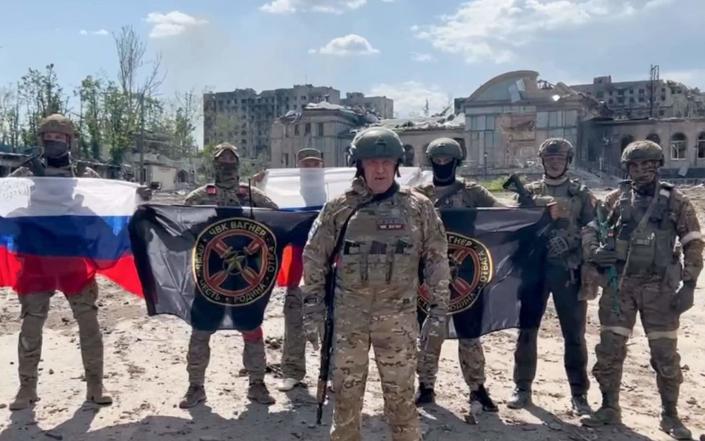
Putin’s misadventures in Ukraine could lead to violent unrest across Russia and the end of the regime. In recent weeks, we have witnessed humiliating drone strikes against Moscow, in the Bryansk and Klimovsky regions, the Krasnodar district and the city of Belgorod. There has been shelling of the Belgorod region, intensified this week and forcing the evacuation of thousands of people.
In a blow to Putin’s authority in early May, the Russian Volunteer Corps and Russia’s Freedom Legion launched a two-day raid across the Ukrainian border towards Belgorod. It has been followed in recent days by an even more powerful ground operation. The Russian Defense Ministry reported that on Thursday two companies of motorized infantry with tanks attacked again in Belgorod, six kilometers from the border with Ukraine. He had to use fighter planes and artillery on his own soil to counter them.
These attacks are extremely important: they represent the first external military ground offensive on the territory of mainland Russia since the Second World War. They may well have corresponding consequences.
Despite Kiev’s denials that it was involved in any of the Belgorod raids, the intention may now be to sow panic inside Russia, forcing Moscow to withdraw its forces. from the front line as the Ukrainian counter-offensive develops. If such raids continue, they could have a more fundamental effect, perhaps creating even greater discontent among residents of the border regions who have already suffered more than most Russian civilians from Putin’s war. Combined with the Russian military’s failures so far and the mounting damage to the country’s economy, this could trigger a chain reaction that ripples through Moscow itself.
Putin, once considered a strategic genius, unwittingly set the stage for what might follow. As he sought to privatize recruitment to fuel his war rather than impose a new wave of forced mobilization, private armies snowballed. The biggest is Wagner, active in Ukraine since 2014 and now a monster. Hot on its heels is Kadyrovtsy, the private army of the infamous Chechen leader Ramzan Kadyrov. It is a large force known for its brutal war crimes in Ukraine and on the verge of returning to frontline combat there.
Many other private armies were created by former military officers, often made up of veterans, financed, equipped and trained by state resources. Remarkably for the non-Russian spirit, even Defense Minister Sergei Shoigu has one of his own, Patriot. There are also corporate militias, such as that of the energy giant Gazprom, which has battalions fighting at the front.
Oligarchs, including Gennady Timchenko and Oleg Deripaska, created their own combat units or attached themselves to existing private military companies. Tellingly, as Wagner boss Yevgeny Prigozhin himself remarked: “Everyone says there will be a power struggle at some point, and everyone needs their own army.”
The Kremlin has also asked authorities in each region to create their own volunteer battalions to fight in Ukraine, with allegiance to local leaders rather than to Moscow. Some of these men will return home disappointed and embittered.
Putin sees these armies as instruments for consolidating his own power and that of the Russian state, not as political actors in their own right. But when the chips are down, he may not be able to call the shots. Prigozhin, for example, is a politically ambitious and unstable man. Although he declared war on the general staff and the “elite” in Moscow, he remained loyal to Putin. It may not take much for that to change. He is unlikely to be reluctant to use the forces at his disposal to maneuver for power and influence when he feels the time is right.
After Bakhmut, Prigozhin’s militia is now retreating from the front line to their bases across Russia. This leaves a large group of armed and battle-hardened men, including many convicted criminals, under their leader’s orders and ready for the fray.
Alongside them – or in opposition – are many others, not only the private military companies and regional battalions, but also the plethora of armed government organs, including the FSB, the GRU and the Ministry of Defence. Then there is the army itself, whose ranks include a large number of abused, humiliated and disgruntled soldiers, commanders and even generals. If Putin cannot fend off growing threats to his own homeland and at the same time secure some sort of victory in Ukraine, it is possible to envisage the collapse of the Russian establishment in a violent melee of opposing armed camps.
Perhaps we should not wish this dark fate on the people of the Russian Federation, but we should certainly wish to see the backs of their current rulers with the industrialized murder, chaos and misery they have inflicted and, s they have the opportunity, will continue to inflict . If this is accelerated by cross-border raids, artillery barrages and drone strikes, we should, like Ukraine, salute them, rather than, like Joe Biden wringing his hands, mourn them. At least our Foreign Secretary, James Cleverly, is determined to make clear his support for Ukraine’s right to defend itself by striking Russian aggressors beyond its borders.
Broaden your horizons with award-winning British journalism. Try The Telegraph free for 1 month, then get a year for just $9 with our exclusive US offer.

